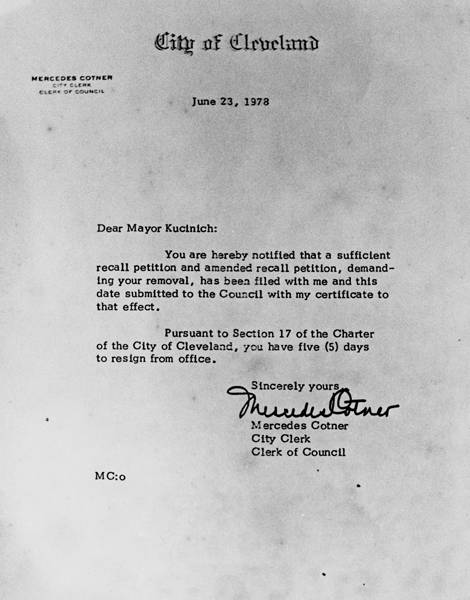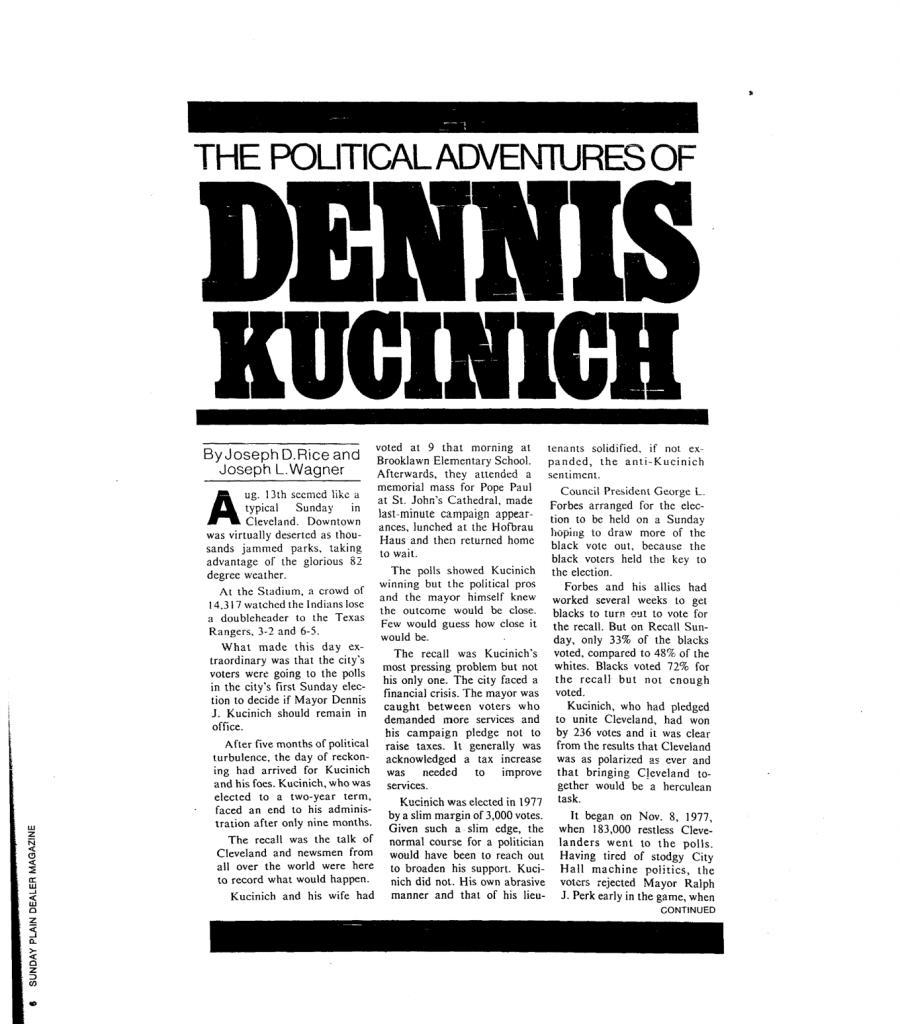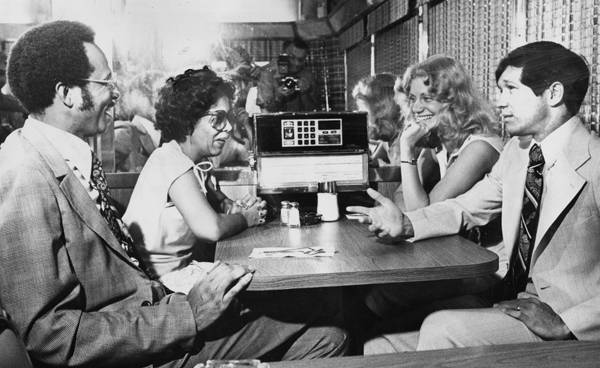
After months of organizing, the movement to recall Kucinich from City Hall seemed to have won its first major victory after winning enough petitions to enforce a recall election.1 Kucinich’s political career was littered with confrontation, and during his mayoralty Kucinich deployed brash political strategies. Standoffs with the city council and its president George Forbes would plague Kucinich for his two years running City Hall.2 Once Kucinich fired popular police chief Richard Hongisto, the organization to recall the mayor came into its own. As the recall movement strengthened, articles in Cleveland saw a noticeable shift from simply observing the ways Kucinich used the media to firmly standing against it. This offensive used Kucinich’s reliance of confrontation, a major aspect of his populist rhetoric, to pin himself Cleveland. In his article “The Prince and the Power,” journalist Frank Kuznik argues that the mayor’s success “will depend on Dennis Kucinich’s ability to sustain the well-polished media image he created for himself.”3 Kucinich’s brashness would soon tarnish this image, cementing his political uncertainty.
New articles written during the recall were a far cry from the praises the print media originally gave to Kucinich while he was on city council. In the Sunday Plain Dealer Magazine, an article entitled “The Political Adventures of Dennis Kucinich” attempts to place a check on Kucinich’s power as mayor.4 Joseph Rice and Joseph Wagner describe Kucinich as irrational and standing in the way of progress for the City of Cleveland. The authors create a David and Goliath relationship between Mayor Kucinich and the “ragtag” leaders of the recall. Cleveland Magazine supplements this article with its own work on Kucinich. “Kucinich on the Couch” was written by young Cleveland journalist Frank Kuznik and peddles a humorous psychoanalysis of Kucinich through the lens of different role models in Kucinich’s life.5 Similar to the political cartoons of the time, Kucinich is seen as boisterous and juvenile, as the paper connects his love of comic books to his own political strategies. Kuznik uses these influences to determine Kucinich as unfit for office.

Instead of the magazine articles from years prior, by mid-1978 more scathing interpretations of Kucinich challenge reflect how newspapers began to use their own authority against the mayor’s influence. Rice and Wagner’s piece in The Plain Dealer reflect a romanticization of the recall, working to illustrate Kucinich as irascible. Comparisons to Marxism are also a blow to Kucinich’s populist strategies, which catered primarily to Eastern Europeans. Rice and Wagner characterize Hongisto as a popular figure who stole political clout away from Kucinich, leading to Hongisto’s termination. Kuznik’s Cleveland Magazine articles convey the feeling that, after ten years of dealing with Kucinich’s media manipulation, the press in Cleveland were fed up with the mayor’s political antics. Kuznik insinuates that Kucinich’s media image was misleading the press and people, and as a result Kuznik argues that Kucinich’s faults leads him towards needing to make a positive public image. These articles highlight the mayor’s need for authority through the press, and the press’ negative reaction to this fact.

The Call and Post had its own evolving strategies regarding reporting on the recall, reflecting the dialogue between Black media and Black representation in municipal government. Originally, George Forbes and Black councilmen refrained from stirring the pot entirely. This was not because the drive in the Black community to oust Kucinich was not motivated on accusations of racism, as Kucinich was blamed for ignoring Black communities in favor of Slavic constituents.6 Rather, Black city officials were worried that forming a coalition against Kucinich would lead to greater media manipulation during the recall, impeding the ability for the recall to succeed.7 As the recall election neared, the tides changed. The Black community began to work towards getting the mayor recalled.8 Editorials accused Kucinich and his voting bloc of making racist remarks, attacking Kucinich much more directly than before.
As seen with the Cleveland Press’s reporting on the blizzard, the Call and Post also attempted to nullify Kucinich’s populism by pinning the mayor on catering to a specific demographic. Black councilmen wanted to avoid a media frenzy since they knew that Kucinich would create drama to racially polarize the recall. An editorial in the Call and Post claimed that politicians like Kucinich were mobilizing Whites against Blacks on certain issues, and the reluctance from Black politicians and the press to back the recall reflects this fear.9 As Black leaders endorsed the recall, the Call and Post, knowing that Kucinich uses the media for his image, directly takes on the mayor by calling out his politics as too selective towards the Slavic neighborhoods of Cleveland. Newspapers like the Call and Post were able to use their platform to dethrone Kucinich’s image in Cleveland, pointing out his biases to divert media manipulation.
- Mercedes Cotner, “Letter from Cleveland Clerk of Council informing Mayor Dennis Kucinich that he is subject to recall from office,” accessed through the Cleveland Memory Project, from Cleveland State University.
- Swanstrom, 203.
- Frank Kuznik. “The Prince and the Power,” Cleveland Magazine, April 1978.
- Joseph D. Rice and Joseph L. Wagner, “The Political Adventures of Dennis Kucinich,” The Sunday Plain Dealer Magazine, September 17th, 1978.
- Frank Kuznik, “Kucinich on the Couch,” Cleveland Magazine, June 1978.
- McClelland, 83-84.
- Larry Bivins, “Blacks Scarce In Recall Movement,” Call and Post, May 6th, 1978.
- “Councilmen Back Kucinich Recall,” Call and Post, July 28th, 1978.
- “Let’s Emancipate Cleveland from Racism,” Call and Post, August 12th, 1978.
